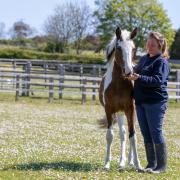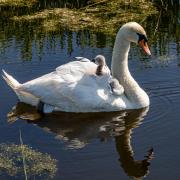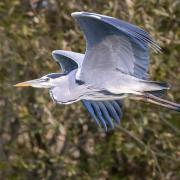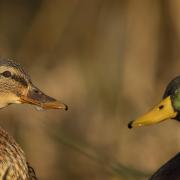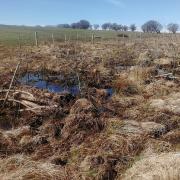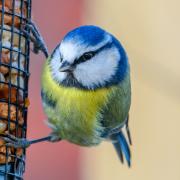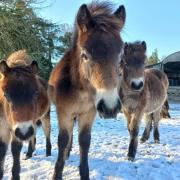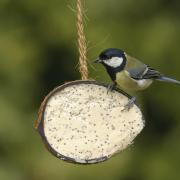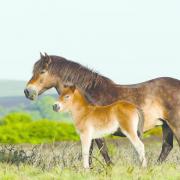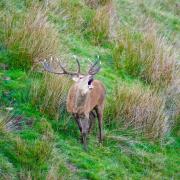Pollinators are in severe decline writes TONY JACKSON, but Somerset Wildlife Trust is on the case

A new report, Insect Declines and Why They Matter, commissioned by Wildlife Trusts in the South West, reveals a drastic decline in insect numbers, a scenario which could have severe consequences for people and wildlife. However, as well as exposing the drastic nature of the decline, the report also highlights the action that needs to be taken to reverse the current trend.
I have always taken an interest in insect life and have been shocked by the loss of so many pollinators which were once taken for granted. The simple fact is that a staggering number of these essential pollinators are in free- fall world-wide and if this trend is not halted terrestrial and freshwater ecosystems will collapse, with severe consequences for humans and the planet. In the UK numbers of butterflies fell by 46 per cent between 1976 and 2017, there has been a 40 per cent loss of larger garden moths in southern England, while a third of our bees are in decline.
The cause for this appalling situation is largely down to habitat loss and the widespread use of pesticides. Over the past century natural and semi-natural habitats have been cleared for farming and building so that important insect populations only exist in fragmented pockets, while around 17,000 tons of pesticides are spread across the land each year. Whilst this is mostly associated with intensive farming, a wide range of fungicides, pesticides and herbicides are also available for domestic garden use. In addition 97 per cent of lowland meadows were lost between 1930 and 1980, as well as thousands of hedgerows and field margins, all of which helped sustain pollinators.
So what can action can be taken to help halt the decline in insect life? A completely fresh approach needs to be taken in order to make major reductions in the routine use of insecticides, herbicides, fungicides and fertilisers. This radical approach will have to apply to farmers, land managers, local authorities and, of course, the public. The Goulson Report notes that a sustainable food and farming Act is required, which secures long-term funding for wildlife friendly agriculture and is an integral part of an Environment Plan. Targets for major reductions in the routine use of pesticides are required and nature-rich developments should be standard.

Somerset County Council, in partnership with Friends of the Earth and Somerset Wildlife Trust, has now published a county-wide strategy to help pollinating insects to survive and thrive. It’s a way forward which is being adopted by a growing list of other counties and Wildlife Trusts. Councillor David Hall, Cabinet Member for Economic Development, Planning and Community Infrastructure, says: “Somerset’s rich habitats, open spaces and productive farmland give it an important part to play in the sustainable future of the country’s pollinator numbers.”
Amongst the proposals in the action plan is a reduction by 25 per cent of grass cutting on council-owned spaces, a review of the use of pesticides by the council and use of alternatives where available and a reduction in the frequency of verge cutting to encourage growth of wild flowers. Also, creation of special verge areas seeded with wild flowers; the creation of pollinator-friendly features in new developments and, lastly, to identify areas of parkland where grass-cutting can be reduced without affecting amenity areas.
What positive action can the homeowner take to assist pollinators? There are around 15 million gardens in the UK, comprising around 700,000 acres, which could become a network of natural reserves. Selected garden flowers play a crucially important role in sustaining life for pollinators, but the first and most important step for the garden or allotment owner is to stop using poisons. Ignore the shelf of pesticides, insecticides, fungicides and herbicides in garden shops and centres. Instead, maintain a healthy soil with plenty of home-made compost and vow to cultivate cottage garden flowers, which will benefit a wide range of pollinating insects. A basic choice would be buddleia, honeysuckle, nicotiana, comfrey, sedum, lilac, poppy, cornflower, forgetmenot, greater knapweed and ivy. . . and even a patch of nettles so beloved by peacock and small tortoiseshell butterflies.
Does Somerset Wildlife Trust use pesticides? A fair question and the answer is ‘yes’, but no more than small amounts of herbicides for target plants only and under controlled circumstances, avoiding contact with other plants. Himalayan balsam, parrots feather and ragwort are removed manually, while manual scrub clearance and cutting to keep on top of re-growth enables species-rich grassland to re-establish and flourish on the Trust’s Reserves.
With 20,000 members Somerset Wildlife Trust is the County’s leading conservation charity, managing more than 1,700 hectares of land.
TAKE ACTION FOR INSECTS!
Insects are dying out up to eight times faster than larger animals and 41 per cent of insect species face extinction.
Take part in the Wildlife Trust’s Action for Insects campaign and pledge a space in your garden for insects and play your part in reversing this decline. Sign up for a free digital guide on insect-friendly gardening and tips on how to go chemical free in your garden!






